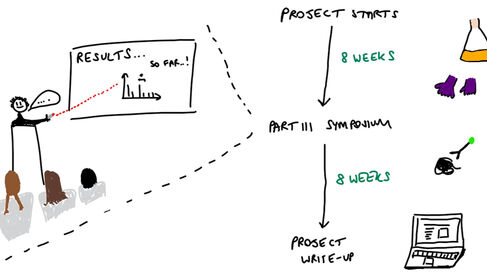
On Tuesday 15th and Wednesday 16th January, the Department held its annual Part III undergraduate students' Project Symposium.
The start of Lent Term here in the Department of Biochemistry would not be the same without the traditional Part III Project Symposium. For those unfamiliar with the Cambridge system, these are fourth year undergraduate students who, as part of their course, spend 16 weeks in research groups conducting independent research.
We are now halfway through the research projects, so this symposium gives the students the opportunity to present their projects to their peers and members of our Department. Projects are mostly undertaken within the Department of Biochemistry, but also elsewhere in Cambridge; the choice being driven by the interests of the students. The breadth of biochemistry and molecular biology presented across these two days is therefore breath-taking. From single genome structure by Hi-C, through characterisation of protein-protein interactions in cell signalling, to identification of virulence factors in bacteria, and analysis of carbohydrate structures in plants.
The quality of the presentations is impressive, and it seems as though every year the bar is raised to the next level. The students' depth of knowledge on their topic, understanding of the techniques, and level of enthusiasm are second to none.
Eleanor Sheekey, a Part III student researching in Professor Jussi Taipale's Group, commented that: "The Part III Symposium was a great opportunity for us to present and discuss our findings so far, practice our presenting skills, and to get feedback and ideas from other members of the Department! I loved getting to hear what my friends are up to in their projects and the enthusiasm they have for their research. I am sure there will be some exciting findings made by the end of the next 8 weeks!"
Eight more weeks remain for the students to work on their projects before Lent Term finishes and it is time for them to start writing their reports. The write-ups will include new and exciting data, which often gets included in publications or used as preliminary data in new grant applications. The students will have gained new skills and knowledge, preparing them for the future, typically for a PhD. And those in the audience have gotten a glimpse of the very latest biochemical research in Cambridge!
